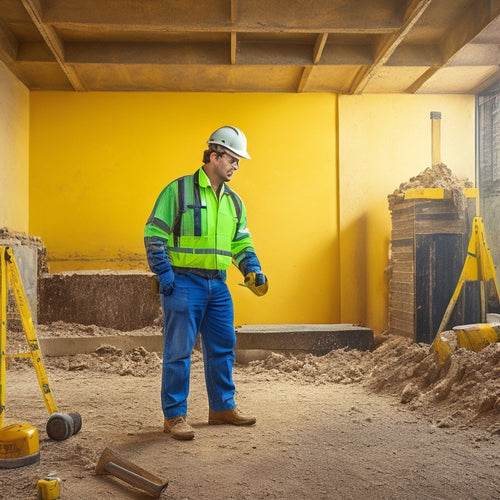
10 Best City Ordinance Guides for Home Renovation
Share
When tackling a home renovation project, you'll need to navigate the complex world of city ordinances and regulations. Failure to comply can lead to costly delays, fines, and even project shutdowns. To guarantee a smooth renovation, familiarize yourself with guides specific to your city, such as Chicago's building code requirements, Miami-Dade County's permit process, or Denver's home renovation regulations. Understanding NYC zoning laws, San Francisco's Green Code, and Los Angeles Municipal Code updates will also be essential. By exploring these city-specific guides, you'll gain a deeper understanding of the regulations governing your project and be better equipped to move forward with confidence.
Key Takeaways
• Familiarize yourself with local building codes and permit requirements to ensure safety and accessibility during renovations.
• Understand zoning regulations and compliance to avoid project delays, fines, and shutdowns.
• Research city-specific guides and updates for home renovation ordinances, such as Denver's renovation guidelines and zoning ordinance updates.
• Stay informed about international building codes, such as the International Building Code (IBC) and International Residential Code (IRC).
• Review online resources, such as municipal websites and e-permit systems, to streamline the permit application process and avoid costly rework.
Chicago Building Code Requirements
You must comply with the Chicago Building Code, which outlines specific requirements for home renovations to guarantee the safety and accessibility of your property.
This code guarantees that your renovation project meets the city's standards, protecting not only your investment but also the well-being of occupants and neighbors.
To initiate the renovation process, you'll need to submit Chicago permit applications, which will trigger a series of Chicago renovation inspections to verify compliance with the code.
These inspections will assess various aspects of your project, including electrical, plumbing, and structural integrity.
It's crucial to familiarize yourself with the code's provisions to avoid costly delays or rework.
By understanding the Chicago Building Code requirements, you'll be empowered to navigate the renovation process efficiently, guaranteeing that your project is completed on time, within budget, and to your exacting standards.
Miami-Dade County Permit Process
In contrast to Chicago's Building Code requirements, Miami-Dade County has its own unique permit process that homeowners must navigate to confirm compliance with local regulations and ordinances. As you commence your home renovation project, it's important to understand the Miami-Dade County permit process to avoid costly delays and fines.
You'll need to obtain renovation permits from the Miami-Dade County Department of Regulatory and Economic Resources (RER) before starting work. The type of permit required will depend on the scope of your project, so it's vital to determine which permits are necessary.
Miami-Dade County's zoning regulations will also impact your project, so be sure to review the Miami Dade zoning ordinances to guarantee compliance.
To streamline the process, you can submit your permit application online through the RER's e-permit system. Be prepared to provide detailed plans and specifications, as well as pay the required fees.
Once your application is approved, you can schedule inspections to confirm your project meets Miami-Dade County's building codes and regulations. By following these steps, you'll be well on your way to a successful and compliant home renovation project.
Understanding NYC Zoning Laws
New York City's zoning laws, governed by the City's Zoning Resolution, dictate how property can be used and developed, greatly impacting your home renovation project's scope and feasibility.
As a homeowner, you must understand these laws to guarantee your project complies with the city's regulations. Failure to do so can result in costly delays, fines, or even project cancellation.
To navigate NYC's zoning laws, consider the following key factors:
-
Zoning Variances: If your project doesn't meet the zoning regulations, you may need to apply for a variance. This involves demonstrating that your project is necessary and won't harm the surrounding area.
-
Building Permits: You'll need to obtain the necessary building permits before commencing construction. This includes permits for electrical, plumbing, and structural work.
-
Zoning Districts: NYC is divided into zoning districts, each with its own set of rules and regulations. Guarantee you understand the specific zoning district your property falls under and the corresponding regulations.
Navigating San Francisco's Green Code
San Francisco's Green Code, an ordinance aimed at reducing the city's environmental footprint, plays a significant role in shaping your home renovation project, much like NYC's zoning laws. As you begin your project, it's vital to understand the code's requirements to guarantee compliance and avoid costly delays.
The Green Code focuses on promoting green building practices, encouraging the use of sustainable materials, and reducing waste. You'll need to reflect on factors such as energy efficiency, water conservation, and indoor air quality when designing your renovation.
To navigate the code effectively, you should familiarize yourself with the city's green building standards, which provide guidelines for sustainable construction practices. You may also want to consult with a professional who's experienced with San Francisco's Green Code to confirm your project meets the necessary requirements.
Los Angeles Municipal Code Updates
You'll need to stay up-to-date on the latest Los Angeles Municipal Code updates, which have a significant impact on your home renovation project, as they dictate everything from building permits to zoning requirements.
Failure to comply can result in costly delays, fines, or even project cancellation.
Here are three key updates to focus on:
-
Los Angeles building permits: Verify you obtain the necessary permits before commencing your renovation project. The City of Los Angeles requires permits for most construction projects, including electrical, plumbing, and structural changes.
-
Zoning regulations: Familiarize yourself with the city's zoning laws, which dictate how you can use your property. Understand the specific zoning designation for your area and how it affects your renovation plans.
-
Los Angeles renovation regulations: Stay informed about regulations specific to your type of renovation, such as energy efficiency standards, accessibility requirements, and environmental regulations.
Austin's Residential Building Codes
Austin's residential building codes, enforced by the City of Austin's Building Inspection Division, dictate the minimum standards for design, construction, and renovation of one- and two-family dwellings within the city limits.
As a homeowner, you need to comply with these codes to guarantee your property meets the required safety and accessibility standards. Before starting your renovation project, you'll need to obtain the necessary Austin permits from the Building Inspection Division. This includes permits for electrical, plumbing, and mechanical work, as well as structural changes to your property.
During the renovation process, you can expect Austin inspections to verify that your project meets the city's building codes. Inspectors will check for compliance with zoning regulations, building envelope requirements, and energy efficiency standards, among others.
It's crucial to schedule these inspections in advance to avoid delays and guarantee your project stays on track. By understanding and complying with Austin's residential building codes, you can avoid costly rework, fines, and even project shutdowns.
Stay informed and plan ahead to guarantee a successful and stress-free home renovation project.
Denver's Home Renovation Regulations
As you plan your home renovation project in Denver, you'll need to familiarize yourself with the city's regulations.
You'll find that obtaining the necessary permits is essential to avoiding costly delays and fines.
Specifically, you'll want to understand the permit requirements and stay up-to-date on zoning ordinance updates that may impact your project.
Permit Requirements
Denver's home renovation regulations stipulate that homeowners must obtain necessary permits before commencing construction to guarantee compliance with safety standards and zoning laws. This assures that your renovation project meets the required building codes and regulations, avoiding costly rework or even project shutdown.
To get started, you'll need to understand the different permit types required for your project. Here are three key permits to take into account:
-
Building Permit: Required for structural changes, electrical, plumbing, or HVAC work.
-
Electrical Permit: Needed for electrical installations, upgrades, or repairs.
-
Plumbing Permit: Required for plumbing installations, upgrades, or repairs.
The application process typically involves submitting plans and specifications, paying the required fees, and waiting for approval.
Once approved, you can commence construction, and inspectors will verify compliance during regular site visits.
Remember to check with the City of Denver's website or consult with a licensed contractor to determine the specific permits required for your project. By following these guidelines, you'll assure a smooth and compliant renovation process.
Zoning Ordinance Updates
You'll also need to take into account Denver's zoning ordinance updates, which govern how your renovation project impacts the surrounding neighborhood and guarantees it aligns with the city's long-term development plans. These updates are vital in ensuring that your project complies with the city's zoning regulations, which are subject to change. Recent zoning changes in Denver have focused on promoting sustainable urban development, emphasizing mixed-use projects, and enhancing pedestrian-friendly environments.
As you navigate the renovation process, it's important to stay informed about zoning ordinance updates that may affect your project. You can do this by regularly checking the City of Denver's website for updates on zoning changes and attending community meetings where urban development plans are discussed.
Seattle's Land Use Code Guide
Seattle's Land Use Code Guide provides homeowners with a thorough framework for steering through the city's regulations and ensuring their renovation projects comply with local zoning laws and ordinances.
As you navigate the complex world of Seattle zoning, this guide serves as a valuable resource, outlining the rules and regulations that govern land use in the city.
Here are three key aspects of the guide that you'll want to familiarize yourself with:
-
Zoning Districts: The guide explains the different zoning districts in Seattle, each with its own set of rules and regulations. Understanding which district your property falls under is essential in determining what renovations are allowed.
-
Land Use Designations: The guide outlines the various land use designations, such as residential, commercial, or industrial, and how they impact your renovation project.
-
Development Standards: The guide covers the development standards that govern aspects like building height, lot coverage, and setbacks, ensuring your project meets the city's requirements.
Boston's Zoning and Planning Rules
As you shift your focus from Seattle's Land Use Code to Boston's zoning regulations, you'll need to familiarize yourself with the city's unique zoning and planning rules to guarantee a successful home renovation project.
Boston's zoning code is divided into nine districts, each with its own set of regulations governing land use, density, and building design. You'll need to determine which district your property falls under to ascertain compliance with the corresponding zoning rules.
When applying for renovation permits, you'll need to provide detailed plans and specifications for your project. Boston's Inspectional Services Department (ISD) will review your application to verify it meets the city's zoning and building codes.
Be prepared to address any potential issues or violations that may arise during the review process. It's crucial to work closely with local authorities and adhere to Boston zoning regulations to avoid costly delays or project setbacks.
Washington D.C. Construction Codes
Steering through Washington D.C.'s construction codes, an important step in your home renovation project, requires understanding the district's unique building regulations and standards. As you navigate the complex process, it's vital to familiarize yourself with the specific requirements that govern your project.
When it comes to renovation permits, you'll need to comply with the following key regulations:
-
Historic Preservation: If your property is located in a historic district, you'll need to obtain approval from the Historic Preservation Review Board (HPRB) before commencing work.
-
Zoning Regulations: Verify your project complies with the district's zoning laws, which dictate building height, density, and use.
-
Building Codes: Familiarize yourself with the International Building Code (IBC) and International Residential Code (IRC), which govern building safety and accessibility standards.
Frequently Asked Questions
Can I Renovate Without a Permit if It's a Small Project?
You're wondering if you can skip the permit process for that small project. While it's tempting, it's important to understand your local government's rules.
Check if your project falls under permit exemptions, such as minor repairs or replacements. Review project definitions to make sure you're not overlooking vital details.
Don't risk fines or legal issues - verify with your local authorities to determine if a permit is required, even for a small project.
How Long Does the Typical Permit Approval Process Take?
You're enthusiastic to start your project, but don't expect permit approval to happen overnight - it's not a magic trick!
The typical permit timeline can take anywhere from a few weeks to several months, depending on the complexity of your project and the approval factors involved.
These factors include the type of renovation, zoning regulations, and the workload of your local building department.
Be prepared to wait, and plan accordingly to avoid costly delays.
Are There Any Tax Incentives for Energy-Efficient Renovations?
When you begin energy-efficient renovations, you'll be pleased to know that there are tax incentives to offset the costs.
You're eligible for energy tax credits, which can greatly reduce your taxable income. Many cities offer green renovation initiatives, providing rebates and incentives for eco-friendly upgrades.
Research local and national programs to maximize your savings. By going green, you'll not only reduce your carbon footprint but also enjoy financial benefits.
Can I Appeal a Denied Permit Application?
When you're at a crossroads, you've got to take a step back and reassess.
If your permit application gets denied, don't throw in the towel just yet. You can appeal the decision and get a second chance.
The appeal process typically involves submitting a revised application, addressing the concerns that led to the initial denial. You'll need to provide additional documentation or modifications to meet the required standards.
Follow the appeal process carefully, and you might just turn things around in your favor.
Do I Need to Hire a Licensed Contractor for My Renovation?
You'll likely need to hire a licensed contractor for your renovation, as they guarantee compliance with local regulations.
A licensed contractor brings valuable expertise in contractor qualifications, guaranteeing your project meets safety and quality standards.
They'll also handle project management, freeing you from logistical headaches.
Conclusion
As you've seen, maneuvering city ordinances can be complex, but understanding them is essential for a successful home renovation.
Did you know that according to the National Association of Home Builders, nearly 70% of homeowners in the US have undertaken a home renovation project in the past two years?
By familiarizing yourself with these guides, you'll be well-equipped to tackle your next project, ensuring compliance and avoiding costly delays.
Stay informed, and renovate with confidence.
Related Posts
-

Create a Home Renovation Project Timeline in Excel
You can create a detailed home renovation project timeline in Excel by setting up a tailored template with separate w...
-

Trowel Tool Cost for DIY Home Renovation Projects
When it comes to your DIY home renovation project, you'll need to budget for a variety of trowel tools, including stu...
-

5 Vital Safety Tips for DIY Renovation Success
When tackling a DIY renovation, you'll need to prioritize safety above all else. Start by protecting yourself from fl...


